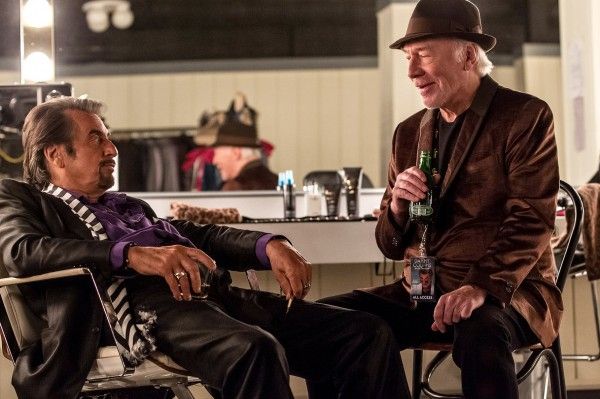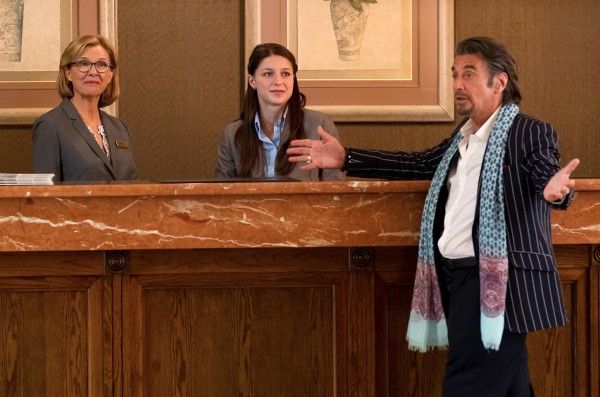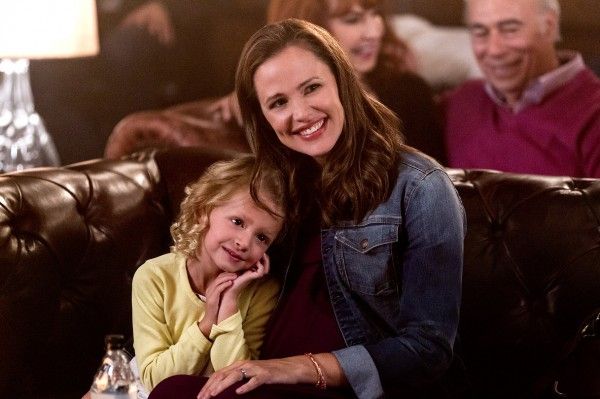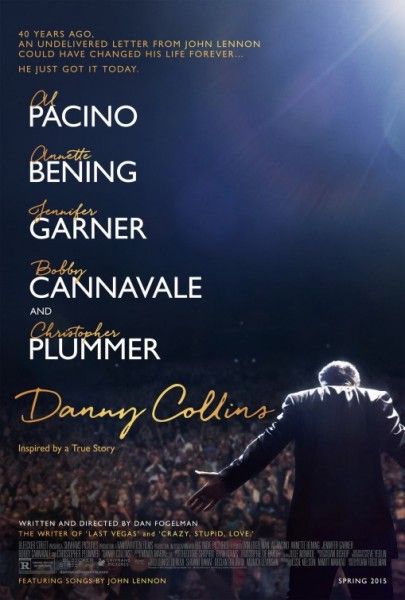Al Pacino has enjoyed a long and impressive career playing some of the most iconic characters in cinema. In his new film, Danny Collins, screenwriter Dan Fogelman’s directorial debut about an aging rock star who is famous, wealthy, and unhappy, Pacino brings to the screen one of his most endearing roles. When Collins’ career and life are reinvigorated by the discovery of a long lost letter written to him by his idol, John Lennon, he realizes there may still be time for a second act. Annette Bening, Jennifer Garner, Bobby Cannavale and Christopher Plummer also star.
In an unforgettable roundtable interview at the film’s recent press day, Pacino broke into song when I asked him about the impact of music on his life. He talked about his love of the acting process, why he still gets stage fright, what appealed to him about his character, why Bening is a ferocious talent, how he’s reinvented himself throughout his career, his musical inspirations from Beethoven to The Beatles, his concert in character with Chicago, what makes a great leading man, how he’s still excited by the work he does, his performance with the Philadelphia Philharmonic, and his return to Broadway in David Mamet’s China Doll.
Check it all out in the interview below:
Danny gets a bit of stage fright when he wants to play his original song and then falls back into his popular one, have you ever had a moment of stage fright or apprehension about delving into something?
AL PACINO: All the time, especially when you’re on stage and you forget your words. There’s nothing like it in the world. You should try it sometime. Three thousand people and you don’t know where you are or what you’ve got to say. You should be saying [something], but then it’s gone. Oh that’s tough! But with all roles, it starts with you’re given a part and you’ve got a canvas and there’s nothing on it. You want to say, “Well how can I take this script and this role and put it on a canvas and make something out of it.” Sometimes it’s a little more daunting than others. But you find after a while, without even knowing it, you have a technique that you go to. You can’t help it. It’s like anything else. It’s like riding a bicycle, you start to do certain things. It’s all a question of how to get there. It’s pretty much the same in the theater. There’s little differences in the theater in the developing of a part. And that's what I do. First is the script. The play is the thing for me. The play is the thing. That’s why I’m there. That’s my sanity -- what’s in that text. And that’s what I’m devoted to.
What aspects of this character did you immediately identify with and which ones did you not?
PACINO: That’s good because I can answer this now and give you a sense of how I worked a little bit. I’ve got a character and I think, “Well I’ve never played a rock star. I’m not a real singer. So I’ve got to do that.” I liked the story, and I’m getting clues from the text as to what happened to this person, and I start that kind of work, which is: Alright who is he? Who is he in relation to me? Who am I? I’m not doing this necessarily consciously. It’s unconscious that this stuff is happening. I came with two images. I thought of Barry Manilow and Rod Stewart – you know, the love child of those two. I thought, “What would that be?” I came out with that. Someone just said, “I saw Bob Dylan and Neil Diamond.” I said, “Hey, that’s a good one. I wish you were around when I first started. That’s a good one, too.” So, you throw floaters out there. Things are all floating around.
You start learning the text. You start thinking of what the character looks like, the images, how you’re going to do it, and it’s this process which doesn’t change much. It’s the same kind of thing. I liked the idea that this guy is a survivor. I think that’s what got to me, because someone comes on touted as the next Bob Dylan, and it’s always good when you know it’s partially true because it lends a credibility to the thing. He’s touted as that, and he’s the next new superstar in this world, but he barely shaves. And then, the next time out, he’s eviscerated. It’s almost incomprehensible that a kid at 20 or 21 can handle it really, and he’s thrown off his game. So what does he do? As a survivor, he resorts to what he knows best – not going back and writing because that’s too… He goes back to using some of the things that he knows he’s in control of, like his dancing, or singing, or his charm, or his looks, which seem to be what’s perpetuating him. Then he goes in there and he does other people’s songs. That’s an idea and he’s able to put them over because he still has the appetite to do it. And somehow he’s going to get back to the writing somewhere, but he has to survive now because he didn’t want to go back there and get hurt again, because maybe it was all luck. Maybe that first song was luck or that first poem.
I liked that survivor that sort of coped using what’s there, what’s available. I think that spurred me, that energized me that someone is like that. But then, that runs out of gas at one point and the juice and the feelings about oneself, especially a creative person like him. Naturally, the booze, the drugs, the lifestyle, the fame, and all of that becomes part of his life and it’s lasting for a while, and then the marriages that he doesn’t even remember, and the slow disintegration starts to come in. It’s classic. It’s just classic. So fortuitous and fatalist was that letter that comes to him [from John Lennon]. Otherwise, he would have gone down that road. It was coming. You knew it. You saw it was coming. He’s going to marry this 25 year old. It’s all like this thing. And then finally, what can I say? There’s a rebirth there in some ways. It couldn’t have happened ten years earlier. The confluence of things is always what does it. And Dan (Fogelberg) picks it up there. This really did happen up to a point. Dan then imagined it. The first part of the story is real. The letter is real and all that.
How easy or difficult has it been for you to avoid the complacency of embracing that comfort creatively for you as an actor throughout your career?
PACINO: Again, you’ve got to reinvent. How do you do that? Well, I have survived because of the text. The texts change, people change. You know I’ve got young children now. So everything changes it and the way you look at things. I just could say it’s luck, too. I’m lucky. I still get excited by doing this, because I won’t do it if I don’t want to anymore. You can’t do it if you don’t.
The other movie I made, The Humbling, the thing that was so tragic and crazy about that picture was it’s about an actor who loses his appetite. Everything about that is really startling because he loses his appetite. Mainly, he loses his memory. And he changes that. He realizes the tools that he uses to act on stage are going. They’re leaving him. His age is what’s dictating what he can do. And that’s a terror, especially if you’re a stage actor. Movie roles run out and now he can’t perform. And so, you can’t do this without an appetite.
How was it working opposite Annette Bening? You had terrific chemistry together.
PACINO: She’s like when you say, “Okay. I see the lioness in the cage. Wow! It’s beautiful.” Then you get in there with it. Whoa! It’s ferocious her talent, her gift, her energy, her artistry which she loves, how she works. It was staggering being around her. She really is... you almost can say she is possessed, but that sounds a little like a pejorative. It’s really that she is amazing and fun, and I love to work with her. I’d love to do something with her again because she demands of you stuff. She’s not done, you know. The director says, “Okay. Cut.” She’s not done. “Let’s do it again. There’s more to mine here. There’s another way to go.” So, it’s so much fun to be around someone like that. Not only is it her colossal talent, but it’s experience, too. She’s done it so much. She knows herself in that area. So you go along for the ride.
Were you a fan of John Lennon’s music and what impact did it have on you?
PACINO: Oh yeah. Well, what impact did The Beatles have, too. It was wonderful. I loved them and the Rolling Stones. I was much more classically bent. I like classical music. It was what I was drawn to early on. So, before we knew of The Beatles, I was interested in that kind of music. I was attracted to it early on. Of course, I liked rock and roll too growing up in the city. I love the 50’s. [He breaks into song singing “Sh-Boom,” a 1954 doo-wop song by The Chords that helped kick-start rock ‘n’ roll] “Sh-Boom, Sh-Boom. Ya-da-di Ya-da-di Ya-da. Sh-Boom, Sh-Boom. Ya-da-di Ya-da-di Ya-da. Sh-Boom. Hello! Ding-gong. Dinga-dinga-ding. Sh-Boom. Whaa-ya.” I’m surprised that that’s back in my head. (Laughs) You guys don’t know what I’m talking about. (Laughs) You don’t.
Do you like to sing?
PACINO: I wish I could sing more but it doesn’t come to me. I love dancing. It doesn’t come to me. I don’t know why. I like it because it’s music. I don’t even listen to music much anymore. I love music. You know it’s so funny because you don’t realize how much it gives you ‘til you go to it. I just did a concert in Philly with the Philadelphia Philharmonic. They played. It was the anniversary of their theater. They’re 158 years old and I did it on the stage of the Academy of Music. I emceed this whole show and I did Shakespeare with the music behind me – select pieces that accompanied certain soliloquys from Shakespeare and poetry. I introduced violinists and cello players. It was a wonderful thing to be around that kind of music. So I may think about doing that again and trying to find that. That is a good outlet for me. It’s being able to know if that is part of your life. Work. I’m doing a Mamet play in the fall. It’s new, a brand new play (China Doll) by David Mamet. Working with him is a real opportunity and a joy. I really honestly don’t want to do anything else right now because this really occupies – what do you call it? --- that distracted globe we call our brain. That’s Shakespeare.
Is there anyone you would have loved to get a letter like this from living or dead?
PACINO: As much as anybody would love to get a letter from somebody like that, I’m sure Beethoven couldn’t write me a letter, but I thought for a while that I was a reincarnate of Beethoven. There was a time when I just started playing the piano. I thought, “Where’s this coming from?” In my own way, I was writing music. There was a tape recorder, and in those days, you had a tape recorder. It wasn’t like this [referring to our digital recorders on the table], which is so easy and you just turn it on and you can tape anything. I was doing that for a while, and what was interesting about it is I was finding that through doing that with the music I was able to reflect on my inner life more and connect to it. I was doing that when I wasn’t doing it in my acting at the time. I wasn’t getting that opportunity or whatever it was. So it was really enjoyable. It really was good to do. And I never went back to it again. Again, like the phases of my poetry that I wrote, the music that I played, I lost it all. I lost it because I had taped it. I don’t read notes. I wish I had found a way to. You lose these things as you move on. The tape recorder is somewhere. It was a cross between Satie (French composer and pianist Erik Satie) and… It just was derivative. You know what I’m saying? I thought I was doing something more special than it was, but still and all, it would have been nice to hear that again.
You don’t have those tapes somewhere?
PACINO: No. I’ve lost them. I’ve written some, what I think to be… of course, when I read it, it would be embarrassing, like my painting which I don’t show anyone because it’s not good. But the poetry, I thought that I had found something. I lost all of it.
When was it that you thought you were Beethoven? How long ago?
PACINO: (Laughs) Just the other day. It makes life easier being Beethoven. No, that was many years ago. I guess it’d be almost close to 50 years ago, or 45 years ago. I mean I use it metaphorically as a joke, please. All I thought was, “Wouldn’t it be great if I were?” That’s better put, I think.
How was it not just singing on camera but also having to sing in front of an actual concert audience?
PACINO: Oh that’s a great question, because it was Chicago at the Greek Theater here in L.A. Chicago of all people. I mean, a great rock group, and Dan Fogelman figured that out, his direction. This is what I mean about him. He worked out this whole idea that he’d get me to go when Chicago was performing at the Greek Theater here. So I got in costume. The thing that made it work for me was I was playing the character, Danny Collins, not myself in terms of being me, Al. And the lead singer there broke the set for a minute and said to the audience, “We have someone here tonight who’s going to come out and sing a song for you. It’s a song from a movie, and he’s a movie actor, and he’s playing a part. So, when he comes out, he’ll be the character in the movie, but you would know him as Al Pacino. He’ll be out here in a couple of minutes.” So, when I came out, the audience was prepared. I came out dressed as Danny Collins. It was thunderous what happened and the energy from the band and everything. I tell you, if it was me without my character, I’d have fainted. I’d have fainted dead away. It was that invigorating. It was amazing. I recommend it. It was like when I saw a racing car cut through a corner on the track at 175 miles per hour. You haven’t lived until you’ve seen that power, that turn. Wow! But it all comes from doing the roles. You play parts. You get exposed to this stuff. It was a great [experience]. It was a first. And I’m 105 so…
What do you think makes an actor a great leading man?
PACINO: A great leading man like Cary Grant, for instance?
Or yourself?
PACINO: Well, thank you for that. That’s a hard one to figure. It’s innate or something. I think it comes with the territory. Let’s put it this way, I just don’t know how Cary Grant did it. When I look at him, I think wow, he had a few attributes, like looks and stuff like that, but at the same time, he also had this delivery, this charisma, this person he became, this persona. Now that belonged to a certain age, a certain era. Movie stars are different today. They were different in the ‘50s, ‘60s, ‘70s, ‘80s, and today. It’s morphed into other things. So you’d say someone like a George Clooney is closer to the ones that I’m familiar with. DiCaprio is another kind of movie star. It’s just a little different. It’s got shadings of that but it’s also more… It’s just different. It’s more character acting. Brando changed all that because Brando was a movie star. He had the equipment, but he was a character actor. And a guy like Cary Grant and Gary Cooper stayed within their [era]. They were great within their thing. They didn’t move into... They have to belong to people like Paul Muni a little bit. Paul Muni and Edward G. Robinson were a little bit before, but during that era, when Brando came in, it was very new what he was doing. When you think of his first four or five movies, they were character-driven and different from each other -- different characters -- and that sort of remained with us over the years.
Where do you place yourself on that spectrum and how has that changed throughout your career?
PACINO: That’s really for you guys to say. I don’t know. I belong in some sort of pantheon of stuff, but I don’t know.
You’ve had some of the most memorable movie lines like “Say hello to my little friend,” “I knew it was you, Fredo,” or even one single word like “Whoo-ah” or “Attica!” What are the lines you hear the most when fans see you?
PACINO: Mainly lines I think from Scarface would be the ones quoted most. There was a time it was, “I’ll make him an offer he can’t refuse,” but that’s dated now. It’s mainly the Scarface ones, which seems to be with me all the time. It’s like I did it last month. It’s amazing how that happened.
Danny Collins opens nationwide on Friday, March 20th.








